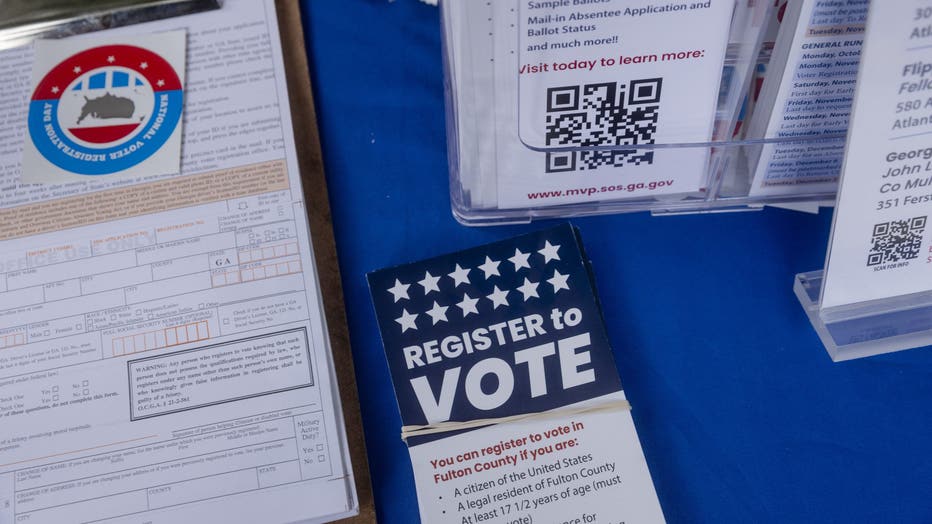SAVE Act: How voter registration would change under proposed bill
ARCHIVE (2024) - Rep. Roger Williams (R-TX) speaks on SAVE Act
Congressman Roger Williams (R-TX) caught up with LiveNOW from FOX's Josh Breslow when the SAVE Act was first introduced in 2024.
A key bill that Republicans had advocated for months is set to get a vote this week after advancing through the House Rules Committee on Monday evening.
Here’s a look at the SAVE Act, and how voter registration processes could change if it’s passed:
What is the SAVE Act?
In short:
The SAVE Act stands for the Safeguard American Voter Eligibility Act, and its intention is to change voting procedures by requiring proof of citizenship.
What they're saying:
Republicans say the current voter registration process relies on what they call an honor system with loopholes that have allowed noncitizens to register and vote in past elections.
Dig deeper:
Passing the SAVE Act would change the voter registration process. It would require showing proof of citizenship, in-person, when registering to vote by way of birth certificate, passport or naturalization certificate.
The SAVE Act would also require states to begin actively removing noncitizens from their official list of eligible voters.
The backstory:
Citing an influx of immigrants in recent years at the U.S.-Mexico border, Republicans have raised concerns about the possibility that noncitizens will be voting.
Before the 2024 election, Donald Trump pushed claims without evidence that such people might vote in large enough numbers to sway the outcome.
The bill already passed the House in July but stalled in the Democrat-controlled Senate.
Since his victory in November, Trump has continued to press for changes.
RELATED: Trump executive order takes aim at voting by undocumented migrants
Big picture view:
Voting by noncitizens is already illegal and can result in felony charges and deportation. Some cities do allow voting by noncitizens in some local elections, such as for school board and city council.

Informational materials and voter registration forms on the table at a volunteer-run voter registration booth on the campus of Morehouse College in Atlanta, Georgia on Tuesday, September 17, 2024. (Photo by David Walter Banks, Getty Images)
Current process:
Under the current registration system, those registering to vote are asked to provide either a state driver’s license number or the last four digits of their Social Security number and are directed to sign an oath swearing they are a U.S. citizen. A few states require a full Social Security number.
Most states currently offer online voter registration, and even more allow for registration by mail. These options would expire as the SAVE Act requires in-person registration.
Opposition the SAVE Act
The other side:
In short, those opposing the SAVE Act say it would make it harder for people to vote as not everyone readily has access to their birth certificate or has the means to obtain a passport, or can easily visit a government office to show these documents in person. They say these barriers could disproportionately affect communities of color and young voters attending school away from home.
Additionally, they say existing laws against noncitizen voting are already working because data indicates voting by noncitizens is rare.
Dig deeper:
Voting rights groups say married women and transgender people could also be disproportionately affected and burdened with additional steps if they’ve changed their name because their current name may not match what’s on their birth certificate.
Local perspective:
State election officials have also expressed concerns about how the new procedure would be implemented and who would pay for it.
Big picture view:
Already-registered voters have potential to be affected by the SAVE Act, too.
This is because of the bill’s requirement that state officials must actively purge their voter list to remove noncitizens. Some recent purges have canceled millions of registrations of eligible American citizens, including military members, according to the voting nonprofit RocktheVote, requiring them to re-register. And those voters would have to re-register under the new procedure.
Meanwhile:
Some states already have laws requiring proof of citizenship for voters and experiences have reportedly been mixed. It has helped establish a system to verify citizenship, but has also been found to prevent eligible people from registering to vote.
What's next:
The reintroduced bill is likely to pass the GOP-controlled House, and is expected on the House floor Thursday morning, FOX News reported.
Looking towards the Senate, the bill would need help from at least some Democrats to meet the body’s 60-vote threshold for advancement.
The Source: Information in this article was taken from H.R.8281 SAVE Act and The Associated Press, which has reported on the bill. This story was reported from Detroit.

